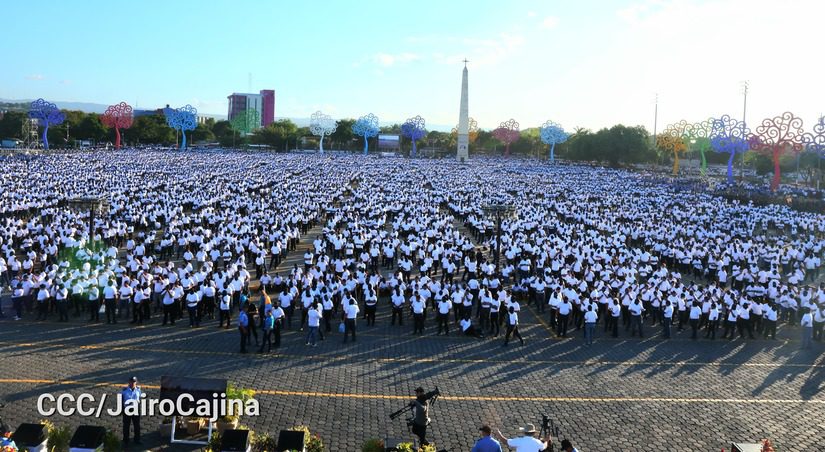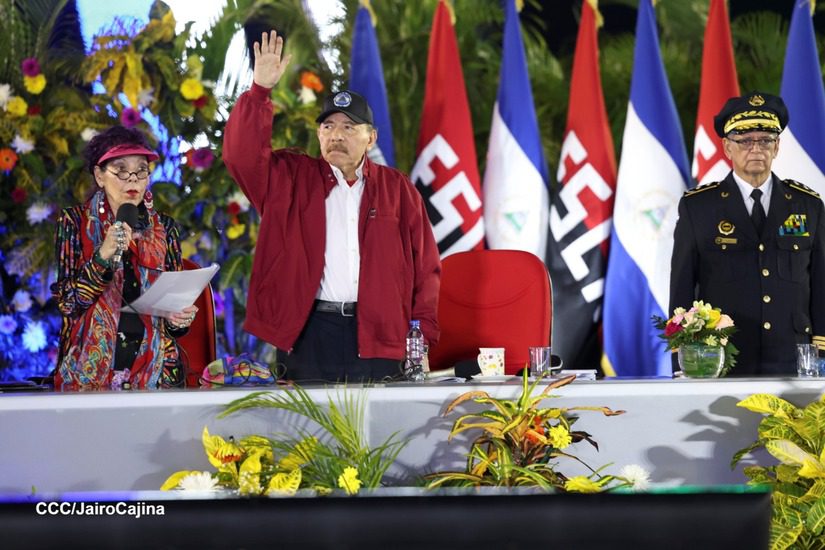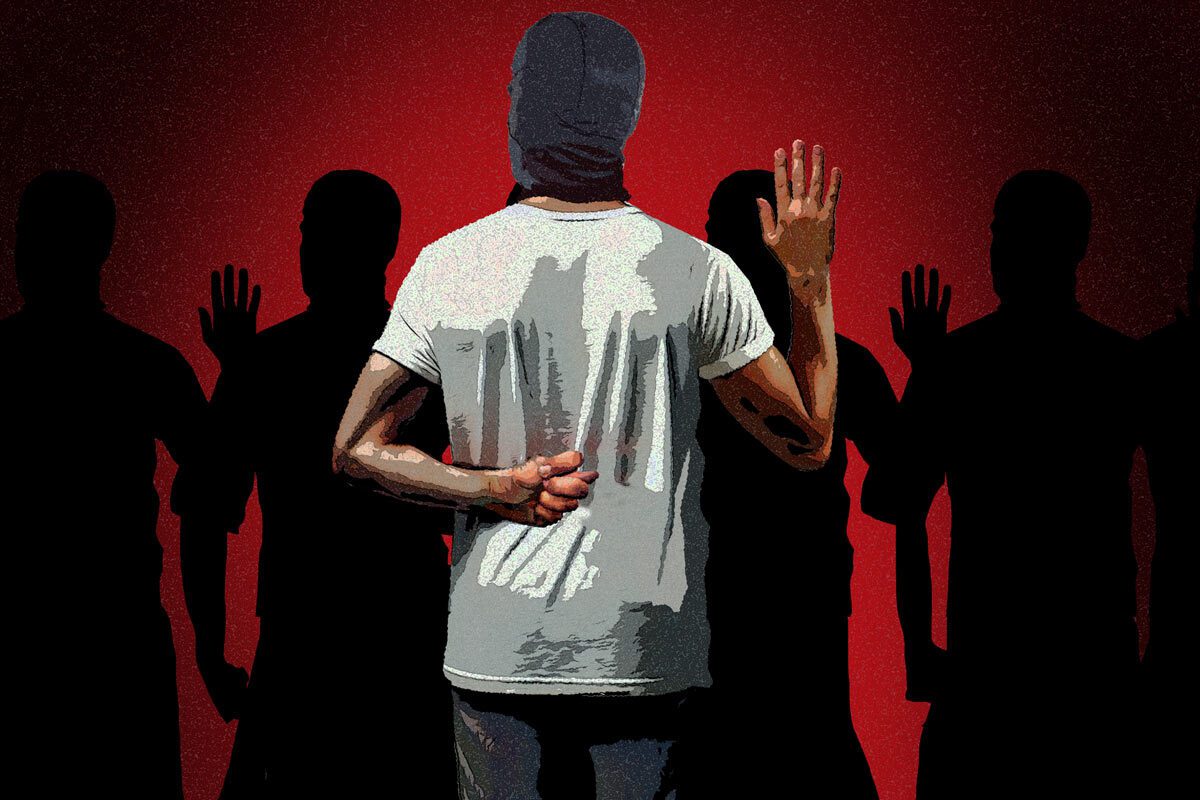Justino doesn’t want to be there. At this hour, as evening falls, just before the partisan event with Daniel Ortega and Rosario Murillo begins, hunger, exhaustion, and heatstroke make him desperate. He knows he can’t break away, tear off his balaclava, and leave the plaza—that could cost him his job as a secretary in a government institution or even land him in prison for defying “an order from above”: the order to swear in as a paramilitary of the Sandinista regime. He seeks solace by whispering an exorcism prayer by Sister María Romero, one he knows by heart:
Stay away from my home, my family, and my country… Infernal demons Here reign God and the Blessed Virgin Mary. In the name of Jesus and Mary, Angels, archangels, virtues, Powers, principalities, dominions, Thrones, cherubim, and seraphim, Help me expel the evil spirits from this house, This family, and this country, so they may never return. In the name of the Father, the Son, and the Holy Spirit. Amen!
He repeats it over and over, with more intensity when the presidential couple appears on the main stage. Justino does not feel like a paramilitary, and he is haunted by the thought that someone he knows—or even one of his young children—might recognize him on television during the broadcast of the swearing-in ceremony for 30,000 paramilitaries in Managua. Then he realizes that, for once, he is grateful for the suffocating balaclava—it keeps his identity safe. The last thing he wants is to be associated with paramilitaries, that armed paramilitary force that, alongside the police, massacred more than 350 people in 2018. A legion of thugs that was legalized in January when Ortega and Murillo reformed the Political Constitution, integrating them under the euphemism of “volunteer police.”
Since the legalization of the paramilitaries, the National Police, led by Commissioner General Francisco Díaz—Ortega and Murillo’s in-law—has been swearing in these paramilitaries in public plazas across the country. It is a grotesque spectacle designed to instill more terror in a nation that already lives in fear, where people whisper their discontent in hushed tones—like Justino’s whispered prayer in the plaza—or talk in code in the kitchens of their homes, just as Russian families did under Stalinism.
Justino was summoned to the plaza the day before, on February 25. He was ordered to report early—5:00 a.m.—to a specific location where a bus would pick him up. In reality, it was an entire caravan of buses moving through the capital and various Pacific municipalities like Granada and Masaya, rounding up state employees. Gathering 30,000 people for the largest paramilitary swearing-in ceremony yet was no easy task, and it was Rosario Murillo herself—the “co-president” and “co-supreme leader” of the paramilitary force—who led the oath-taking. For Justino, it was a “false oath” because, like his exorcism prayer, he repeats to himself that he is not a paramilitary.
Stay away from my home, my family, and my country… Infernal demons.
This February 26 ceremony was the culmination of previous swearing-in events in other regions, where thousands more paramilitaries were inducted—2,000 in Estelí, another 1,000 in Madriz, and so on. Now, there are 76,800 “volunteer police officers,” vastly outnumbering the 28,400 active-duty police officers. Ortega and Murillo have created a paramilitary state, legitimized by a Constitution tailored to their dynastic succession plan. But Justino insists—again, as we speak—that he is not like the others he met at Plaza La Fe.
“There were people fully convinced of it, of being paramilitaries. I saw them. These are people who can hurt you… seriously hurt you,” Justino tells me under the condition that I do not reveal his identity or anything that might make him identifiable. He is afraid. He explains that recruiting 30,000 people for the swearing-in was a struggle for the regime because the first paramilitaries called were public employees who had already attended military training camps last year—programs meant to prepare them for “a potential coup attempt.”

Divergentes | El 19 Digital.
The public employees summoned to these mandatory military camps were mostly low-ranking staff: drivers, security guards, janitors… The Sandinista recruitment drive carried a clear classist bias—mid- and high-level officials were not required to take the paramilitary oath. Justino, a secretary, had never been summoned for anything paramilitary-related until February 25, when he received a call from an unknown Sandinista political secretary: “Report at 5:00 a.m. to a designated location with your ID and wearing the following: black pants, black shoes, and a white T-shirt.”
“They couldn’t gather enough people from the military camps to reach 30,000, so they called people like us, who had never been summoned before. Look, I can assure you that more than half of those 30,000 in the plaza didn’t want to be there. There were even elderly people with canes. It was heartbreaking. Others were crying and fainting from heat exhaustion,” Justino recalls.
They picked him up early at the agreed location—he didn’t want them coming to his house. On the bus, they handed out a simple breakfast, but Justino didn’t eat. He already knew exactly why he was being taken to the plaza, and it crushed him. No appetite. He could only think about his children (“What will they think if they find out I’m swearing in as a paramilitary?”). The bus caravan spent the entire morning picking up more people. Around noon, they arrived at the Alexis Argüello Sports Complex, where their IDs were confiscated and checked against lists held by Sandinista Youth members and uniformed police. They were allowed to bring nothing and were ordered to turn off their phones. No photos, no videos.

They waited in the open air for hours, given only warm bottles of water. Some were handed white T-shirts. And then, the balaclavas. They had to put them on—hiding their identities, the defining trait of paramilitaries. Around 3:00 p.m., with Managua’s sun scorching Plaza La Fe, they were forced into formation. Forced to rehearse. “Stand at attention!” the commanders shouted. “At ease!” The most well-trained were those who had attended the military camps. Justino, unwilling to participate, was clumsy with the drills. He struggled to pay attention. Seeing people collapse from the heat and hunger, he panicked. He felt trapped in the public square. He longed to run, to escape, but fear—of losing his job, of retaliation—kept him in place. He endured. And then, that exorcism prayer came to mind again.
In the name of Jesus and Mary, Angels, archangels, virtues, Powers, principalities, dominions, Thrones, cherubim, and seraphim, Help me expel the evil spirits from this house, family, and country…
“I felt ashamed, morally crushed. I felt awful because I didn’t want to be there,” Justino says. He muttered the prayer and lowered his head in anger. Over and over, he prayed. Then the sirens blared—the presidential convoy had arrived. He remembers nothing from Ortega and Murillo’s speech.
“The heroic volunteer police, warriors of peace, defenders of peace,” Murillo read aloud, officially making Justino a paramilitary—something he never wanted to be. He doesn’t even know if he raised his hand in response. He only closed his eyes and prayed harder.
Stay away from my home, my family, and my country… Infernal demons.
The event ends, and the organizers send them back to the buses. Justino, exhausted and nearing midnight, finally regains his appetite. He stops at a fritanga and orders an enchilada, but then realizes he doesn’t have any money or cards—just twenty córdobas in his pocket. He apologizes and heads to a convenience store to buy a bag of chips and a bottle of water. All he wants now is to go home and stop repeating the exorcism prayer of Sor María Romero. He doesn’t know if it protected him, but it certainly helped him keep from breaking down in that plaza.





